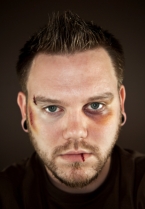 That men are raped is not in question. For example, see the Abused Empowered Survive Thrive and website, which has several large sections specifically for men, such as Male Rape Myths and Research and Statistics on Male Abuse Survivors.
That men are raped is not in question. For example, see the Abused Empowered Survive Thrive and website, which has several large sections specifically for men, such as Male Rape Myths and Research and Statistics on Male Abuse Survivors.
As of 2011, the CDC estimated that almost 20% of women suffered rape in their lifetime. (By the way, just as a man’s physiological body response to rape is involuntary, so is a woman’s. This does not indicate arousal or consent for either sex. Keep reading.)
The same as for female rape survivors, many ignorant people in society hold bigoted or erroneous views about male rape survivors:
- Men can protect themselves, so he must’ve wanted it or else he would’ve stopped it.
- Now that he’s been raped, he’s homosexual.
- He was homosexual anyway, so it’s all just sex for him.
- He was homosexual anyway, so he deserved it.
- A real man could have kept it from happening.
While many of the emotional needs of male survivors are the same as those of female survivors, men have some unique needs. First, here are some struggles both sexes face:
- They feel violated and disempowered.
- They question themselves.
- They lose confidence in their ability to protect themselves.
- They wonder if they did something to bring the attack on themselves.
- They think they should’ve done more to stop it. Or less. Or something different.
- They feel blamed by society (“If she hadn’t gone to a bar dressed like that it wouldn’t have happened,” “If he was straight it wouldn’t have happened,” “Why did you provoke the attacker?”, etc.).
Here are some of the unique struggles men face:
- They feel emasculated.
- They wonder if they’ve become homosexual.
- They wonder if it happened because they’re homosexual (data shows that homosexuals are in fact targeted; I don’t know of an exhaustive study showing how rapists target male victims in general).
- Society believes men can’t be sexually assaulted by women, but they can be–and this is a stigma as well, with many people viewing the male victim as weak or as less of a man, or thinking that a “normal” man would be glad to “have sex,” or assuming that no woman could be strong enough to rape a man. (Aaaand we’re back to the “not a real man” myth.)
- Sketchy information shows that men (no matter who does the attacking) are even less likely to report rape than women because of the stigma attached to the “weakness” of a male victim or the stigma of questions about his sexuality or masculinity.
- There aren’t many resources for male rape survivors, so they’re more isolated and less served than women. Even factoring in the lower proportion of male survivors to female survivors, there aren’t a proportionate number of resources specifically for male survivors. Most services for female survivors also serve male victims, but here I’m talking about services that are dedicated to male survivors.
- Male survivors may have had an erection or ejaculation during an assault and feel guilty about it; the attacker or the victim’s friends/family may assume this means the victim must have “wanted it,” when in reality, both erection and ejaculation are physiological responses to stress that don’t require sexual arousal and that a man can’t voluntarily control.
Some of the good resources I can find for men are listed here.
- Articles, Information and Education on male sexual assault. This looks like a terrific list; unfortunately when I sampled the links I found that most of them don’t work. This page has clearly not been updated in a long time. The few links do work, though, lead to good material.
- Male Sexual Assault. This is the main page leading to the above list. Same deal–most of the links don’t work.
- For Men Only. Great resources and info from the University of Texas Austin. Definitions, myths, what to do, more.
- Sexual Abuse of Males. A Ph.D. has written up his research and information, mostly on sexual abuse of boys before age 16.
- MaleSurvivor. Tremendous resource on sexual victimization of boys and men.
- Men and Sexual Trauma. Good listing from the U.S. Department of Veterans Affairs.
- National Organization on Male Sexual Victimization. The name explains it. Lots of information, statistics, what you can do.
- Men Can Stop Rape. Facts, myths and resources on male sexual assault.
- Male Survivors. Help page from Brown University Health Education with statistics, information, more.
- Male/Male Sexual Violence, from Advocates For Youth in Washington, D.C.
- Male Survivors of Sexual Violence, a PDF analysis of studies and statistics on male sexual victimization compiled by the Michigan Resources Center on Domestic and Sexual Violence.
No one, no matter what their age, race, or sex, deserves to be raped or has “asked for it.” Rape doesn’t change people’s sexual orientation, and it isn’t OK to rape a man because “men want it all the time anyway.” Rape is never a turn-on. Raping men isn’t OK, and it’s never the victim’s fault — not ever. I will shout this from the housetops. To male assault survivors: You are not alone. We women have been attacked too, and we stand with you. We believe you. We believe in you. We want more for all rape survivors, no matter who has been attacked.
Related articles
- Former Marine To Fox News: Sexual Assault Should Not Be Part Of My Job (thefrisky.com)
- Profile of a Female Perpetrator (rapeinfo.wordpress.com)
Filed under: for men, rape, sexual assault, sexual assault info | Tagged: crime, homosexual, male, male rape, men, rape, Rape by gender, Sexual abuse, sexual assault, victim |



Leave a comment